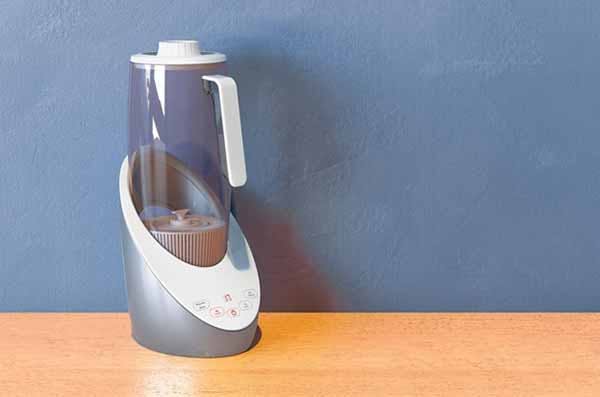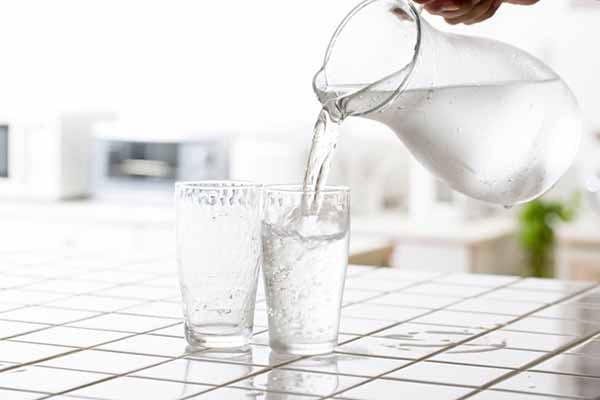🌟 New Arrival! Upgrade Your Water with Our Advanced Pitcher Filter. Shop Now
August 2022
Ionized Alkaline Water: Health Benefits and FAQs
If you're looking for ways to be healthier, ionized alkaline water might be on your radar — though you may ask yourself, "Isn't a glass of water just a glass of water?"
You've seen it for sale in stores and heard something about the benefits to the human body, but perhaps you're curious about its health claims. Maybe you've tried it, but you still have questions about the body's pH and its importance to your health.
In this article, we discuss what ionized alkaline water is, its purported health benefits, and whether or not adding alkaline water to your daily regimen is right for you.
What Is Alkaline Ionized Water?
Understanding alkaline water requires a little scientific background. You might remember talking about the pH scale in chemistry class, but what does this measurement mean for water?
Alkaline water is the polar opposite of acidic water. Therefore, alkaline water presents with a higher pH level than pure, plain water.
The acronym pH stands for "potential of hydrogen." The pH scale starts at zero and goes up to 14.
- A pH of 1 is acidic. Lemon juice, grapefruit juice, and tomato juice fall in the 2-3.5 pH range.
- A pH of 7 is neutral; regular tap water and our blood typically measure at a pH of 7.
- A pH of 14 is base or alkaline. Baking soda has a 9.5 pH, so if added to acidic water, it can increase the pH to make it alkaline.
In the U.S., any water above a pH of 7 is can be sold as alkaline water. Alkaline water can occur organically or it can be manufactured.
When water becomes alkalized through water electrolysis, it’s called alkaline ionized water. During electrolysis, water is separated into acidic and alkaline components. Some home filtration systems use electrolysis, so you can have fresh alkaline water any time you want.
Does Ionized Alkaline Water Have Health Benefits?
There are at least two studies that attest to the benefits of alkaline water.
One medical study in China documented the benefits of drinking ionized alkaline water. This study included participants with high blood pressure (hypertension), diabetes, and high cholesterol (hyperlipidemia). After an ionized alkaline water regimen, the participants’ blood pressure, blood sugar, and cholesterol readings "decreased significantly[,] even to normal ranges."
Another study looked at alkaline water as a potential treatment for laryngopharyngeal reflux. One group of participants took a class of drugs called proton pump inhibitors. The second group underwent an alkaline water regimen and a plant-based Mediterranean diet. At the end of the study, the researchers determined that the alkaline water and Mediterranean diet were "at least as good, if not better," than proton pump inhibitor treatment.
How Much Alkaline Water Should I Drink Every Day?
You can replace all of your water consumption with alkaline water if you'd like. But how much water should you drink?
There’s conflicting information about how much water — alkaline or otherwise — we should drink every day. You've probably heard the recommendation of eight 8-ounce glasses per day. That guideline is easy to remember and provides you with a half-gallon of hydration.
But yet another recommendation requires you to do a little math. A good measure is a half-ounce of water for each pound you weigh. That amount is more customized than the one-size-fits-all recommendation of 64 ounces a day.
While these guidelines differ, they make us aware of our water consumption and motivate us to drink more. And that's certainly not a bad thing. But ultimately, you should listen to your body. The Mayo Clinic recommends that you ask yourself two questions about your water consumption:
- Are you rarely thirsty?
- Is your urine clear or pale?
You're drinking enough water if you can answer "yes" to both of those questions. Signs that you need to drink more water include fatigue, headache, and dry mouth.
Unless your doctor places you on a fluid-restricted diet, you can drink as much alkaline water as you wish. However, you may find that you need to drink more water on hot days, when you exercise, or if you have diarrhea or vomiting.
What pH Level Should I Select on My Ionizer for Alkaline Water?
A water ionizer is a small countertop appliance used to increase the quality and health benefits of your drinking water. The ionizer is connected to your kitchen plumbing and uses a process called electrolysis to separate water into acidic and alkaline streams.
If you've purchased a home filtration system, you may not know which pH level to start with. However, if you've already been drinking bottled alkaline water, you can start with that pH level.
If you don't know the pH of the alkaline water you already drink or are new to alkaline water, start with a lower pH. For example, try a pH of 7.5 or 8.
What Is the Healthiest Water to Drink?
There are numerous types of water on the market today. In addition to alkaline water, there’s also spring, mineral, distilled, and purified water. All of these choices can raise a lot of questions.
What do these terms mean? And what about coconut water — is that even technically water? Lastly, which type of water is the healthiest to drink?
Let's take a look.
Purified water is any water that goes through a mechanical process to remove impurities like contaminants and certain minerals. In the U.S., tap water is filtered according to drinking water regulations set forth by the Environmental Protection Agency (EPA). Bottled water may also be classified as purified.
Spring water is collected from underground water sources called aquifers. This water often comes from a spring, where the water naturally rises to the surface. In some cases, spring water is obtained through a borehole drilled into the ground. Spring water is considered naturally purified, as different soil components such as clay and limestone remove impurities from water.
Mineral water is also sourced from an aquifer via a spring or borehole in the ground. The distinction between mineral water and spring water is that mineral water naturally contains certain minerals like calcium, magnesium, potassium, and zinc. The Food and Drug Administration (FDA) prohibits artificially adding minerals to mineral water sold in the U.S.
Distilled water goes through a boiling process to remove impurities and minerals. Many household appliances and medical equipment need distilled water, such as CPAP machines, essential oil diffusers, and humidifiers. So, yes, you can drink distilled water. But unless your local water source is unsafe, there really is no reason to. In addition, distilled water has a distinct taste that many people find unpleasant.
Coconut water is a term that can create confusion among consumers. This drink is not water but the fluid found inside of a coconut. Unlike regular water, coconut water does contain calories. However, its caloric content is less than most juices or sodas. Since coconut water is technically a beverage, it doesn't have the same regulations as water. Be sure to read the nutrition label to ensure you don't consume any unwanted additives or sugar.
The healthiest water is the water you drink, enjoy the taste of, fits your budget, and is available to you. Alkaline water, in particular, has scientifically proven health benefits.
How Long Does Alkaline Water Stay Ionized?
If you use a home filtration system to ionize your water, you should drink the water right away. Many sources estimate that alkaline ionized water starts to change after 18-24 hours. Stored alkaline ionized water is still safe to drink, but the benefits of the alkalization will dissipate over time. When you use your home ionizer, you can have fresh alkaline water at any time.
Is Alkaline Ionized Water Good for You?
Drinking alkaline ionized water is an effective way to stay hydrated, just like tap water and hydration supplements other healthy behaviors like exercise. Some scientific research has also suggested that alkaline water decreases high blood sugar, blood pressure, and cholesterol. In addition, alkaline water, when combined with a plant-based Mediterranean diet, may also be an effective way to treat laryngopharyngeal reflux.
Can You Drink Alkaline Water Every Day?
Yes, you can drink alkaline water every day. Many people enjoy the taste of alkaline water, and there are many health benefits of drinking water throughout the day.
Alkaline water hydrates you and prevents constipation and the formation of kidney stones. Drinking enough water also has positive psychological and cognitive benefits. However, being even mildly dehydrated can have a negative impact on your mood and memory.
Does Apple Cider Vinegar Make Water Alkaline?
No, adding apple cider vinegar to plain water will not make it more alkaline. In fact, the opposite is true. Apple cider vinegar is acidic, with many products ranging from a pH of 2-3. So while proponents claim that apple cider vinegar has many health benefits, making water alkaline isn't one of them.
When Will I Notice the Health Benefits of Alkaline Water?
You may notice favorable results in a few weeks. Food Network chronicled one woman's switch to alkaline water. For two weeks, she replaced all of her plain water with alkaline water that had a pH of 9.5 or higher. At the end of two weeks, she reported that her skin was less dry and she had less acne. She also experienced a reduction in acid reflux.
In the laryngopharyngeal reflux study, participants saw a reduction in symptoms six weeks after starting their Mediterranean diet plus an alkaline water regimen.
Drinking water helps with weight loss, the aging process, and eliminating free radicals. You can keep a diary of skin, digestion, and other health changes to track your benefits.
Are There Any Side Effects Related to Drinking Alkaline Water?
For the vast majority of people, there are no health concerns associated with drinking alkaline water. While alkaline water has recently gained popularity because of its health benefits for most, its existence is nothing new.
Water with a pH level over 7 occurs naturally. Well water can have a pH of 8.5 or higher.
The problem with naturally occurring alkaline water with a pH of 8.5 or higher is that it may taste bitter. A home filtration system, such as the Whole Home Filter by HomeWater, eliminates any unpleasant taste yet still provides you with the health benefits of high-pH water.
And while the EPA recommends that tap water have a pH of 6.5-8.5, the organization doesn't enforce deviations from these levels.
Is Ionized Alkaline Water Worth the Hype?
Specific health benefits of alkaline water are backed by limited research. For example, alkaline water has been shown in one study to reduce laryngopharyngeal reflux and in another study to lower higher than normal blood sugar, blood pressure, and cholesterol levels. And as Dr. Robert Ashley from UCLA states, "A slightly high pH or not, water is the healthiest drink you can choose."
Alkaline water offers potential health benefits that plain water doesn't. If you like the taste, alkaline water is a healthy option that can help you reach your hydration goals.
Brought to you by homewater.com
All images licensed from Adobe Stock.
Featured Image


